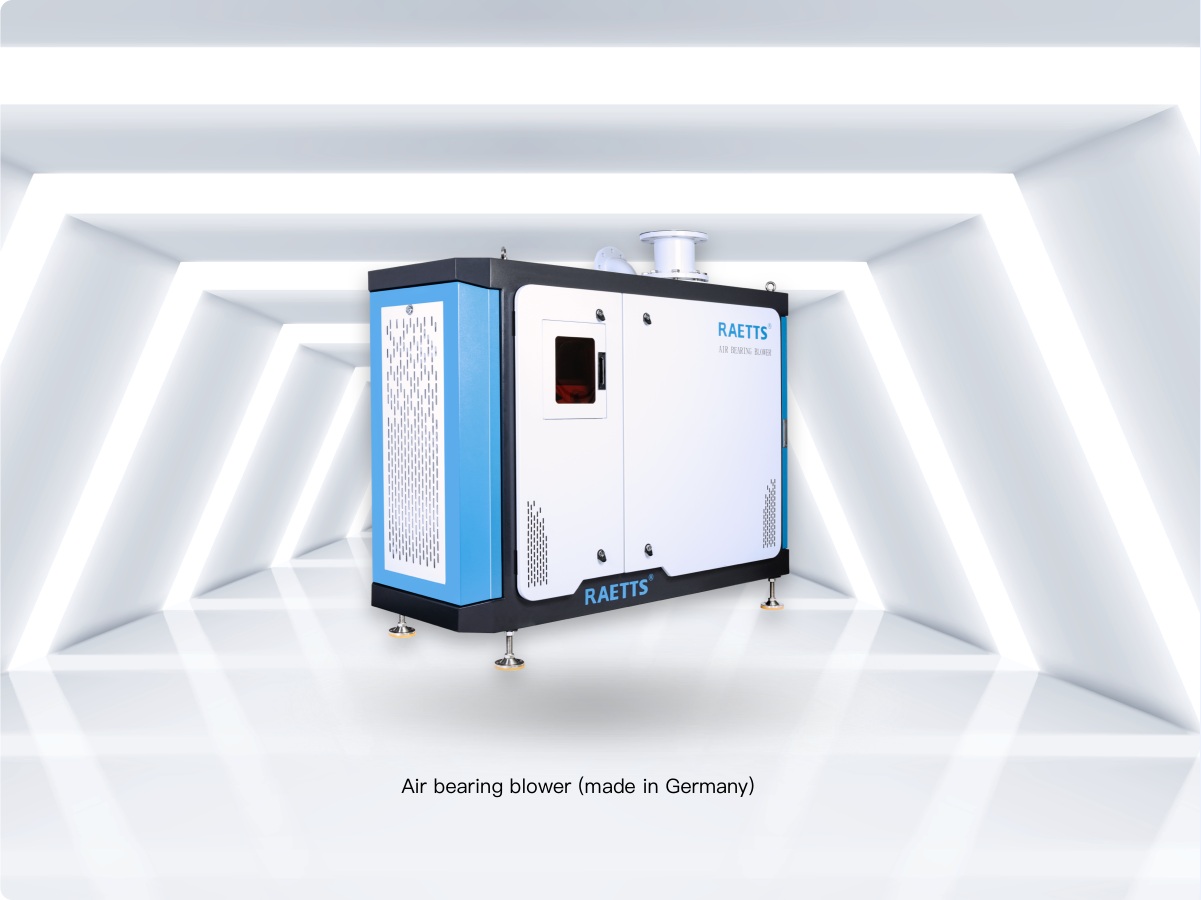1. Introduction to Turbo Blowers in Power Generation
Turbo blowers play a pivotal role in numerous industrial applications, with power generation being one of the most critical sectors where their advantages are fully realized. As a leading manufacturer of turbo blowers, RAETTS recognizes the importance of these systems in enhancing the efficiency and sustainability of power plants. Turbo blowers offer superior performance in terms of energy efficiency, airflow consistency, and operational flexibility, making them ideal for various processes in power generation.
In this article, we will explore the key applications of turbo blowers in power plants, highlighting their importance in improving overall system performance, reducing energy consumption, and ensuring smooth and continuous operation.
2. The Role of Turbo Blowers in Power Generation
Turbo blowers are used to provide high-pressure, high-flow air to various processes within power generation facilities. Their ability to deliver consistent, reliable airflow is essential for maintaining the efficiency of systems such as combustion, cooling, and air pollution control.
- Combustion Support: In many power plants, particularly in coal, gas, and biomass facilities, turbo blowers provide the necessary airflow to support combustion. By supplying large volumes of air at high pressure, these blowers ensure that combustion processes proceed at optimal efficiency, improving energy output while reducing emissions.
- Cooling Systems: Turbo blowers are crucial in providing air to cooling towers, where air is used to dissipate heat from the plant’s systems. Proper cooling is essential for maintaining plant equipment and preventing overheating. Turbo blowers ensure that the cooling system operates efficiently, thereby enhancing overall system reliability.
- Air Pollution Control: In modern power generation plants, controlling air pollution is a key concern. Turbo blowers are used in various air pollution control systems, such as scrubbers, to help filter and remove harmful particles and gases from exhaust emissions. The high-pressure airflow provided by turbo blowers facilitates the movement of scrubbing agents, ensuring efficient cleaning and reducing the environmental impact of power generation.
3. Key Applications of Turbo Blowers in Power Plants
Turbo blowers are integral to several systems within power generation, offering a wide range of benefits that directly impact the efficiency, sustainability, and reliability of power plants. Below are some key applications:
3.1 Combustion Air Supply for Boilers
In thermal power plants, the efficiency of combustion directly influences the plant’s overall performance. Turbo blowers are widely used to supply combustion air to the boilers. These blowers provide the necessary pressure and volume of air to ensure that the combustion process is stable, complete, and efficient.
- Function: Turbo blowers push air into the combustion chamber, ensuring a steady supply of oxygen to the fuel. By maintaining the correct air-to-fuel ratio, turbo blowers help maximize combustion efficiency, reduce fuel consumption, and minimize harmful emissions.
- Benefits: The high efficiency of turbo blowers enables consistent combustion control, improving the thermal efficiency of the power plant. Additionally, they help reduce the production of nitrogen oxides (NOx) and other pollutants that contribute to environmental pollution.
3.2 Cooling Systems for Heat Dissipation
Power plants generate large amounts of heat, and effective cooling is essential for preventing equipment failure and maintaining safe operating conditions. Turbo blowers are commonly used in cooling towers to provide high-pressure air that aids in heat dissipation.
- Function: In cooling towers, turbo blowers provide airflow to promote the evaporation of water. This process transfers heat away from the plant’s cooling system, ensuring that temperature-sensitive equipment remains within safe operating limits.
- Benefits: By improving cooling efficiency, turbo blowers help reduce the energy consumption of auxiliary systems, extend the lifespan of equipment, and enhance overall system reliability.
3.3 Gas and Air Pollution Control Systems
Modern power plants are under increasing pressure to reduce emissions and minimize their environmental impact. Turbo blowers play a critical role in air pollution control systems, particularly in scrubber and deNOx systems, which remove harmful gases and particulate matter from exhaust streams.
- Function: In a scrubber system, turbo blowers generate the high-pressure airflow necessary for circulating scrubbing liquids (usually water or alkaline solutions) to capture harmful gases such as sulfur dioxide (SO2), nitrogen oxides (NOx), and particulate matter. This prevents these pollutants from being released into the atmosphere.
- Benefits: Turbo blowers enhance the efficiency of scrubbing systems, leading to lower emissions and compliance with environmental regulations. By improving air quality and reducing harmful emissions, turbo blowers contribute to the sustainability of power generation operations.
3.4 Fluidized Bed Combustion Systems
Fluidized bed combustion (FBC) is an advanced combustion technology used in some power plants to burn fuels more efficiently and with reduced emissions. Turbo blowers are used to supply air to the bed of fuel particles, keeping them suspended and allowing for more uniform combustion.
- Function: Turbo blowers provide high-pressure air to the fluidized bed, ensuring that the fuel particles remain suspended in the combustion chamber. This promotes better heat distribution, enhanced combustion efficiency, and lower emissions.
- Benefits: By using turbo blowers in fluidized bed systems, power plants can increase fuel efficiency and reduce fuel consumption. Additionally, FBC technology allows for the use of a variety of fuels, including low-quality or waste fuels, making it a versatile and cost-effective solution.
3.5 Ventilation and Aeration in Wastewater Treatment
Many power plants also operate wastewater treatment facilities, where air is supplied to aerobic microorganisms to break down waste products. Turbo blowers are used in aeration systems for wastewater treatment, providing the necessary oxygen for microbial activity.
- Function: Turbo blowers supply oxygen to aeration tanks, promoting the growth of microorganisms that consume organic waste materials in the wastewater. This process is essential for reducing the biological load on the plant’s effluent, ensuring compliance with environmental standards.
- Benefits: Turbo blowers in wastewater treatment systems improve oxygen transfer efficiency, reduce energy consumption, and enhance the overall effectiveness of the treatment process.
3.6 Pressure Support for Gas Turbines
Gas turbines are often used in combined cycle power plants to generate electricity. Turbo blowers are used to supply compressed air to gas turbines to support the combustion process, enhancing turbine performance and efficiency.
- Function: Turbo blowers provide a constant flow of high-pressure air to the combustion chamber of gas turbines, ensuring the proper combustion of fuel and maintaining consistent turbine performance.
- Benefits: By ensuring efficient fuel combustion, turbo blowers help maximize the output of gas turbines while minimizing fuel consumption. This leads to improved overall efficiency of the combined cycle power plant.
4. Advantages of Turbo Blowers in Power Generation
Turbo blowers offer several key advantages over traditional blower systems, making them the preferred choice for many power generation applications:
- Energy Efficiency: Turbo blowers are highly energy-efficient compared to conventional centrifugal or positive displacement blowers. Their design reduces power consumption, which leads to lower operating costs and improved overall efficiency of the power plant.
- Low Maintenance: Turbo blowers require minimal maintenance due to their simple design and frictionless operation. This results in reduced downtime and lower maintenance costs, making them a cost-effective option in power plants.
- Quiet Operation: Turbo blowers operate quietly, which is crucial in environments where noise levels are a concern. This is especially beneficial in large power plants that require multiple blowers operating simultaneously.
- Variable Speed Control: Turbo blowers can be equipped with variable speed drives, allowing for better control of airflow and pressure to match the specific demands of the system. This flexibility helps optimize energy consumption and performance.
- Compact Design: Turbo blowers have a compact footprint, which is advantageous in power plants where space is limited. Their small size allows for easier integration into existing systems without the need for major modifications.
5. Turbo Blowers in Renewable Energy Power Plants
In renewable energy power plants, such as those that rely on biomass, biogas, or waste-to-energy technologies, turbo blowers can play a vital role in improving system efficiency. The versatility of turbo blowers allows them to adapt to the unique demands of renewable energy applications, offering reliable performance even with variable fuel types and combustion conditions.
- Function: In biomass and waste-to-energy plants, turbo blowers help provide consistent airflow to support combustion, aiding in the conversion of waste into usable energy. They also improve the overall energy efficiency of the plant by ensuring optimal combustion conditions.
- Benefits: Turbo blowers enhance the economic viability of renewable energy plants by improving combustion efficiency, reducing fuel consumption, and minimizing environmental impacts. This makes them an essential component in the transition to cleaner, more sustainable energy sources.
Turbo blowers are integral to the efficient and reliable operation of power generation facilities. With their superior performance, energy efficiency, and versatility, these blowers are essential for combustion support, cooling, air pollution control, and many other processes in power plants. At RAETTS, we are committed to delivering high-quality turbo blowers that contribute to the optimization of power generation systems, ensuring improved efficiency, reduced environmental impact, and long-term operational success.





